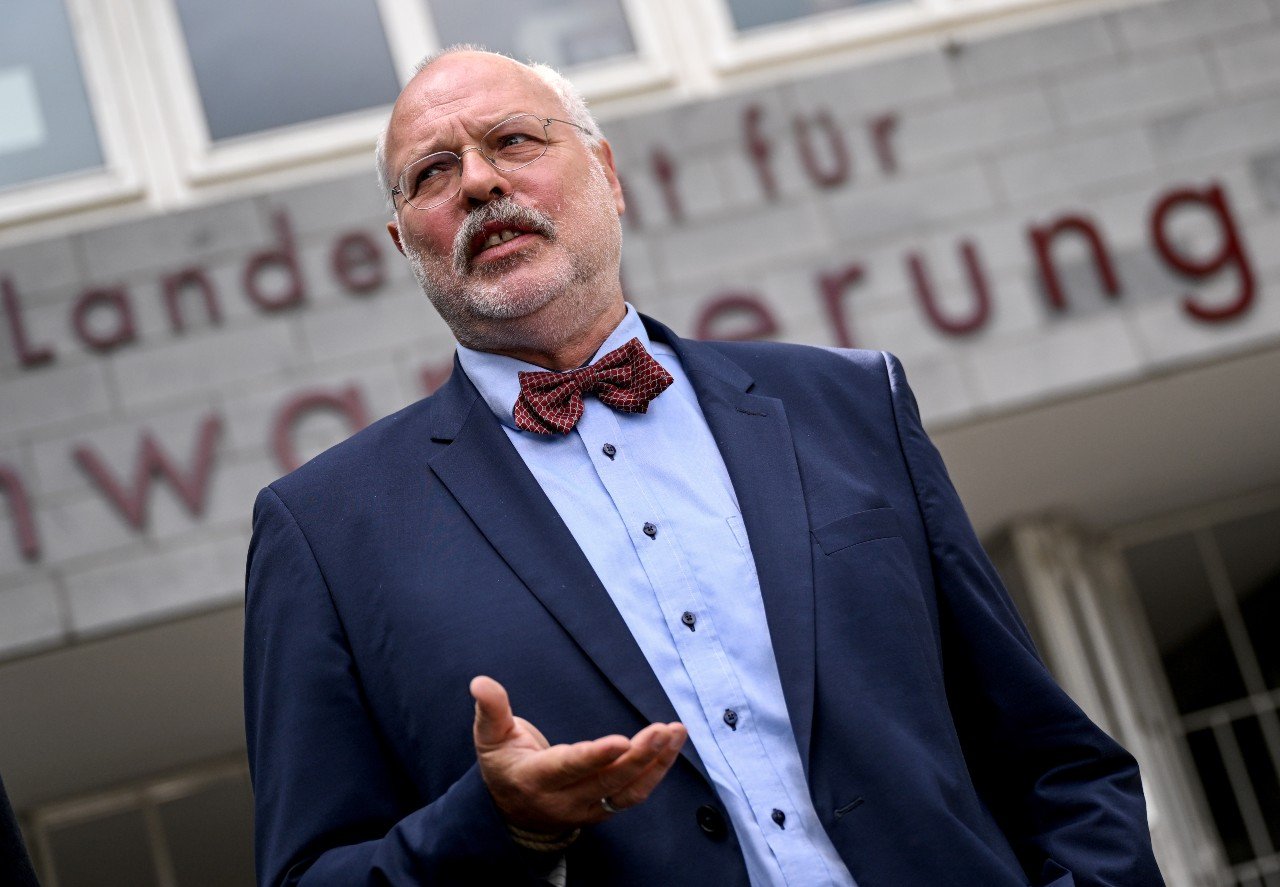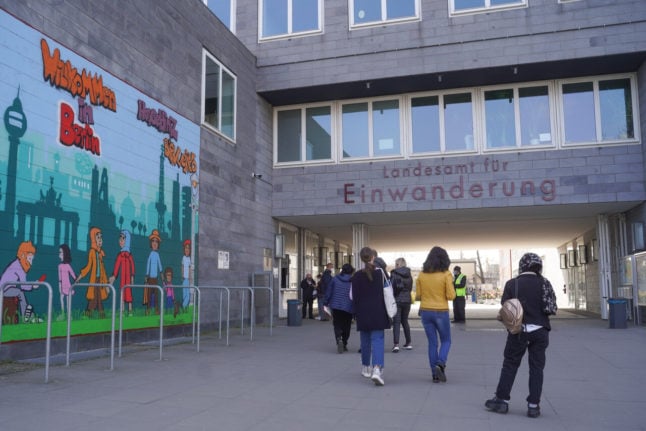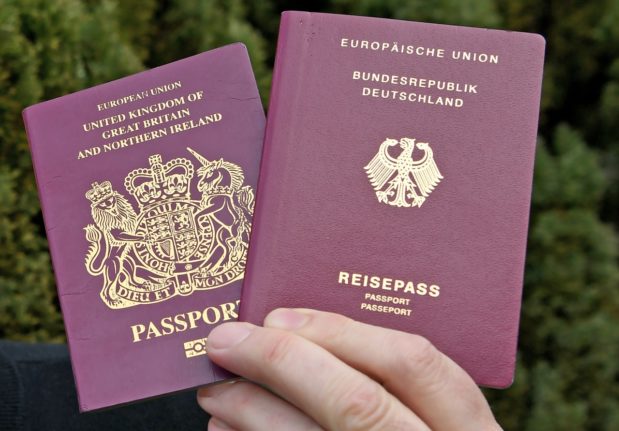Around 50 people arrived at the new centralised citizenship office in the Berlin district of Wedding on Friday morning to protest on behalf of the some 40,000 foreigners that still haven’t received a decision on their citizenship applications.
Registered under the theme of “Rapid processing of naturalisation applications for refugees”, the event attracted numerous asylum seekers, but also a wider pool of foreigners who wanted to express their hurt and frustration at the slow processing times.
Holding German flags and signs detailing how long they had been waiting – some 18 months, some more than three years – the group demonstrated outside the immigration office (LEA) before heading inside to speak with officials who worked there.
In a tense and sometimes heated exchange with the director of the LEA, Engelhard Mazanke, protestors demanded to know why many new applicants had already received their naturalisation documents while others had heard nothing for several years.
One attendee pointed out that, on social media groups, there had been several posts from people who had applied for citizenship this year under the new digital system and had already been invited to pick up their certificate of naturalisation.
READ ALSO: Why German citizenship applications in Berlin are facing delays
Meanwhile, applicants who had submitted paper applications as long ago as 2020 are still waiting for answers.
According to Mazanke, the LEA has hired a contractor to digitalise older applications and forward those to case workers as they come in. “This service provider is in arrears, which means that we don’t even have all their files yet, they are still in some securely locked warehouse in Brandenburg,” he said.
Citizenship office staff are receiving around 300 to 400 of these a day, along with around 100 new applications, which are being processed in tandem. “But if we don’t have the file, we can’t start working,” Mazanke explained.
The head of the LEA is hopeful that the rest of the paper applications will be digitalised by the end of June. “I hope so and I believe that this is realistic,” he said. “Until then, we can only work with the files we have.”
That involves processing the newest applications before documents become out of date.
“I know that this accusation of injustice always comes up: why have I been waiting for 18 months and if my best friend submits a digital application tomorrow, which he can do without a consultation, and pays the fee immediately, then he might be naturalised in two months,” said Mazanke. “That’s not fair.”
That said, the LEA is “not BER”, he said, referring to Berlin’s scandal-hit airport that took almost two decades to build.
‘80,000 new applications’
At the start of the 2024, Berlin commenced a major overhaul of its citizenship processes, opening a large centralised office to replace the smaller offices in the boroughs.
The new office on Sellerstraße was designed to speed up the processing of applications by implementing digital systems and massively increasing staffing levels from around 80 to 210.
Though many of the open positions have not been filled yet – Mazanke estimates there are about 50 percent more staff than in the boroughs, but says hiring is still ongoing – the new digital processes are already speeding things up.
Since January 1st, people have been able to complete a quick online pre-screening instead of a phone consultation and submit their application entirely online.
READ ALSO: Berlin launches online German citizenship application form
With all of these changes and an imminent influx of new staff, Mazanke said he wants to increase the number of applications processed each year to at least 20,000.
Nevertheless, the upcoming dual nationality reform, which looks set to come into force in July, is likely to open the floodgates to an even larger wave of applications.

According to LEA estimates, as many as 80,000 people – primarily from the Turkish and Kurdish communities – could submit an application after the new law comes in later this year.
This number could, however, be even larger: according to Mazanke, the federal government is on the verge of launching a major campaign to encourage people to become German. In Berlin, that means as many as 330,000 people could apply.
All these unknowns mean nobody can say for sure how long it will take to reduce the mountain of unprocessed applications, the LEA director said.
“I hope that we will be able to clear this backlog at some point,” Mazanke said, pointing to the new systems they had put in place. “But I can’t promise you it’ll be this year.”
For those frustrated with the current situation, there was an alternative option: resubmitting a digital application and paying a futher €255.
“We can’t directly recommend you do that,” Mazanke said. “But if you were to do that of your own accord, it may be helpful to both you and us.”
READ ALSO: How fast will Berlin’s new citizenship office process applications?
‘I expected this’
Though the LEA director was thanked for his time with a polite round of applause, the feeling in the room was one of frustration and disappointed resignation.
Wasim, a Syrian national who has been living in Germany since 2013, said he was irritated by the excuses that he had heard at the meeting.
“I expected that,” he said. “It really exposes the procedures in Germany: their only excuse is a new building, and we are just supposed to accept that.”

After a year of learning German to fluency, Wasim started work in 2014 and has worked and paid taxes in the country ever since. He submitted his application in 2020 but, almost four years later, there still hasn’t been a decision.
“You see that some people are applying online and getting their citizenship faster,” he said. “It’s unfair – they should do something.”
But Gabi Rissmann, a pensioner who advocates on behalf of refugees, said she was satisfied with the answers given by the authorities.
“I can absolutely understand the difficulties they’re facing,” she said.
Whether satisfied or disheartened, the foreigners demonstrating at the LEA on Friday left with one clear message: nobody has any clear deadline in mind for processing those 40,000 plus older applications. No matter when they submitted their applications – and the oldest unprocessed application goes back as far as 2010 – they’ll just have to be patient.



 Please whitelist us to continue reading.
Please whitelist us to continue reading.
Member comments